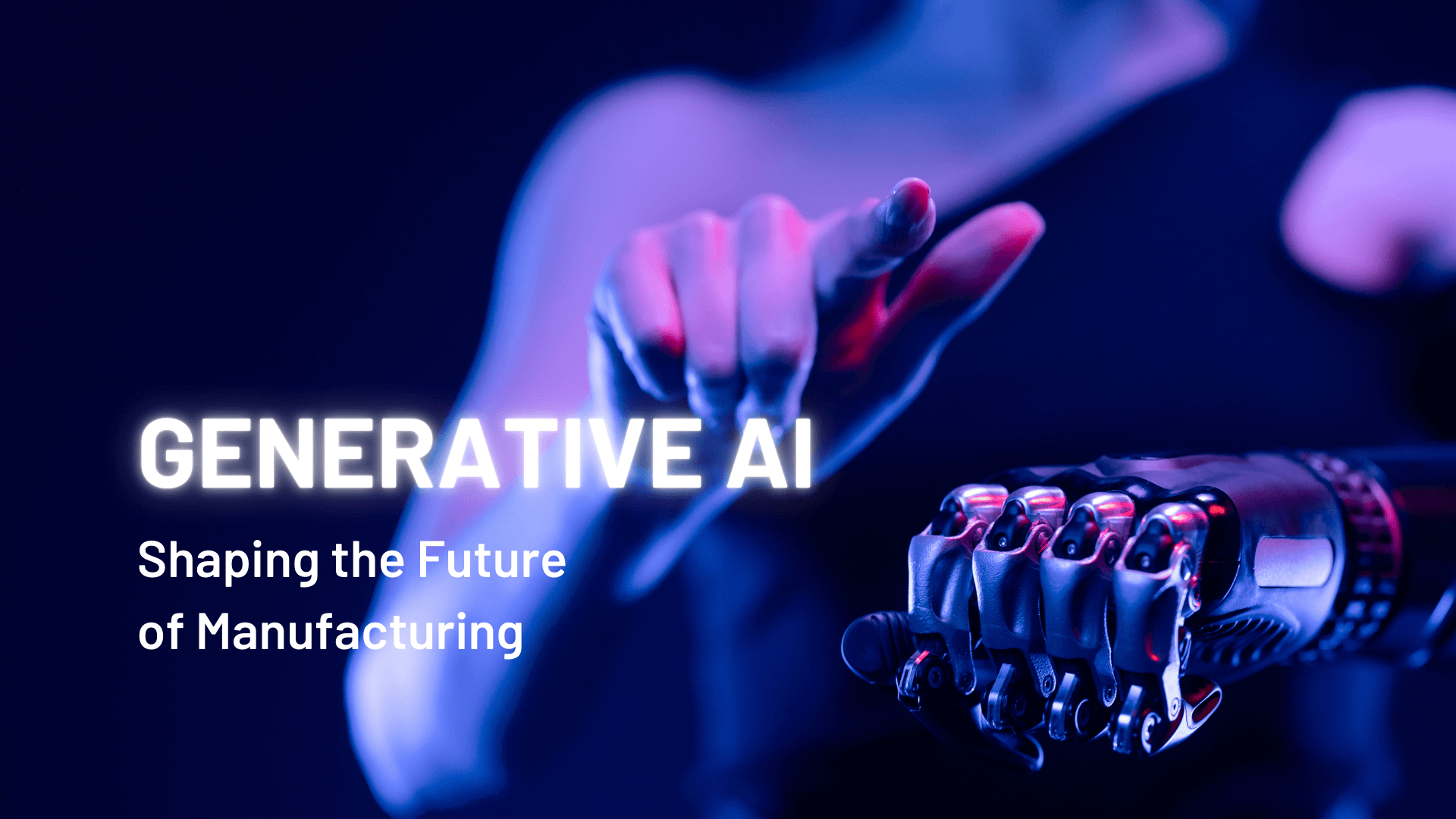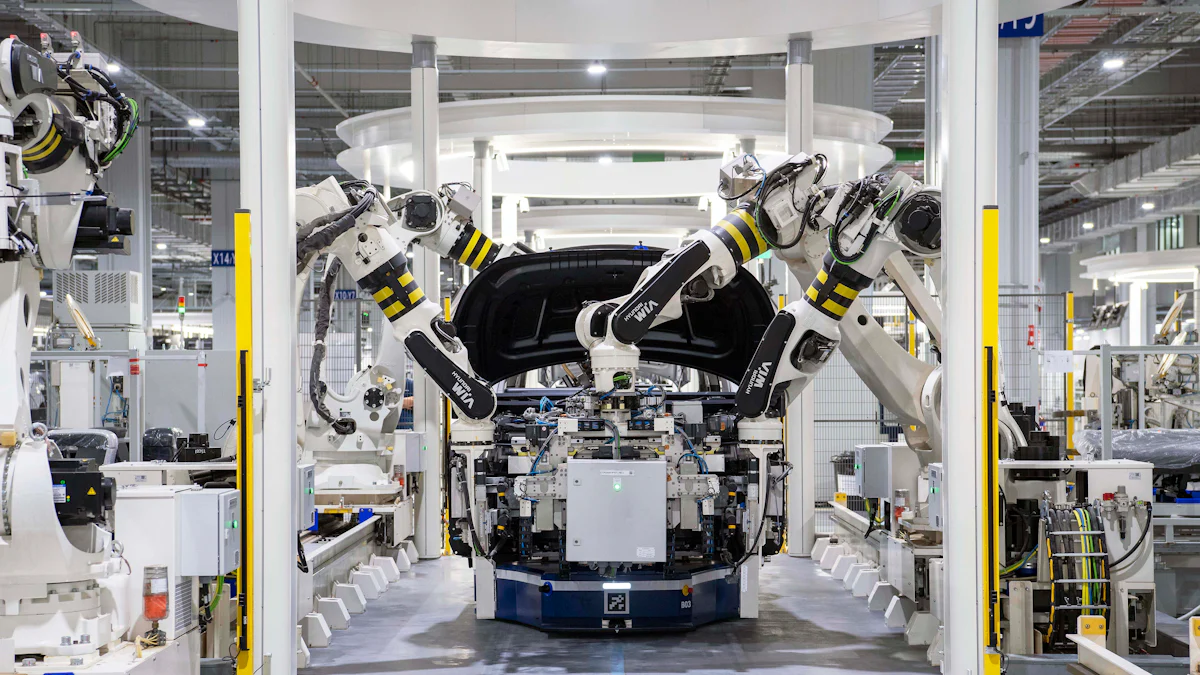How Generative AI is Shaping the Future of Manufacturing

"The future of manufacturing lies in the hands of those who embrace innovation." This statement rings true as generative AI in manufacturing emerges as a transformative force. The industry stands on the brink of a revolution, driven by the integration of smart technologies. Generative AI offers a solution to longstanding challenges, enhancing efficiency and creativity. As factories evolve, they adopt this technology to foster growth and innovation. The learning curve may be steep, but the potential rewards are immense. Embracing generative AI will redefine the landscape, setting new standards for excellence.
What is Generative AI?
Generative AI represents a groundbreaking advancement in artificial intelligence in manufacturing. It refers to AI systems capable of creating new content, such as images, patterns, or simulations, that closely resemble real-world scenarios. Unlike traditional AI, which analyzes existing data, generative AI produces new data, offering innovative solutions to complex problems. In the context of manufacturing, this technology enables the creation of realistic datasets that can simulate various production conditions, enhancing the overall efficiency and adaptability of factories.
Core Capabilities in Manufacturing
Simulating rare defects in products.
Generative AI excels in simulating rare defects in products, a crucial capability for the manufacturing industry. Factories often struggle with the scarcity of defect samples, which hampers the training of AI models. By generating realistic defect images, generative AI provides a solution to this challenge. It allows manufacturers to simulate defects like scratches, dents, and discoloration directly on product surfaces. This capability ensures that AI models can accurately detect and address these issues, even when actual defect samples are limited.
Generating realistic datasets for AI training.
The ability to generate realistic datasets for AI training is another significant advantage of generative AI in manufacturing. Traditional methods require extensive data collection, which can be time-consuming and costly. Generative AI reduces this burden by creating diverse datasets with minimal sample requirements. For instance, UnitX's new generative AI functionality can train AI models with as few as five sample images. This feature accelerates model development and enhances the accuracy of defect detection, making it an invaluable tool for smart factories.
Enhancing visual and functional inspection processes.
Generative AI plays a pivotal role in enhancing visual and functional inspection processes within factories. By augmenting datasets with AI-generated samples, manufacturers can build robust detection models that handle complex and variable defect scenarios. This technology improves the precision of quality control measures, ensuring that products meet high standards before reaching the market. Additionally, generative AI offers flexibility across various industries, including automotive, electronics, and cosmetics packaging, where inspection systems must adapt to diverse product types and materials.
The Challenges in Manufacturing Today
The manufacturing industry faces several significant challenges that hinder its progress and efficiency. These challenges include data scarcity for AI training, costly downtime, inefficiency, and a lack of flexibility in inspection systems. Addressing these issues is crucial for the industry to fully leverage the potential of smart technologies and generative AI.
Data Scarcity for AI Training:
Manufacturers often struggle with collecting sufficient defect samples from production lines. This scarcity poses a major obstacle to training AI models effectively. Rare defects, although infrequent, can have a profound impact on product quality and safety. Without adequate data, AI systems cannot accurately predict or identify these anomalies, leading to potential risks in the production process.
Difficulty collecting sufficient defect samples from production lines: Factories frequently encounter challenges in gathering enough defect samples for AI training. The rarity of certain defects makes it difficult to compile a comprehensive dataset, which is essential for developing accurate AI models.
Impact of rare defects on product quality and safety: Rare defects, though uncommon, can significantly affect the quality and safety of products. Without proper detection and management, these defects can lead to product recalls, customer dissatisfaction, and potential safety hazards.
Costly Downtime and Inefficiency:
Stopping production lines to identify and collect defective samples results in costly downtime and inefficiency. Traditional manufacturing processes often require halting operations to manually inspect and gather defect samples. This interruption not only increases operational costs but also delays production schedules, affecting overall productivity.
Lack of Flexibility in Inspection Systems:
Traditional inspection systems lack the flexibility needed to adapt to high-mix production environments. These systems often require bespoke setups tailored to specific products, limiting their applicability across diverse manufacturing scenarios. As a result, factories face challenges in maintaining consistent inspection standards for various product types and materials.
By addressing these challenges, the manufacturing industry can enhance its operational efficiency and embrace the full potential of smart technologies. Generative AI plays a pivotal role in overcoming these obstacles, offering innovative solutions that drive growth and innovation in the factory environment.
How Generative AI Solves These Challenges
Generative AI in manufacturing offers innovative solutions to overcome the industry's longstanding challenges. By leveraging artificial intelligence in manufacturing, factories can enhance their operational efficiency and adaptability. This section explores how generative AI addresses data scarcity, improves AI model accuracy, and provides cost-effective solutions.
Data Generation
Generative AI revolutionizes data generation in the manufacturing industry. Factories often face difficulties in collecting sufficient defect samples for AI training. Generative AI solves this problem by creating realistic datasets that simulate various production conditions. This capability allows factories to generate high-quality defect images directly on product surfaces, simulating real-world scenarios. By doing so, manufacturers can train AI models with minimal sample requirements, significantly reducing the need for large datasets. This approach accelerates model development and enhances the accuracy of defect detection, making it an invaluable tool for smart factories.
Improved AI Model Accuracy
Artificial intelligence in manufacturing relies heavily on accurate models to ensure quality control and efficiency. Generative AI enhances AI model accuracy by providing diverse and comprehensive datasets. By augmenting datasets with AI-generated samples, factories can build robust detection models that handle complex and variable defect scenarios. This technology improves the precision of quality control measures, ensuring that products meet high standards before reaching the market. Additionally, generative AI offers flexibility across various industries, including automotive, electronics, and cosmetics packaging, where inspection systems must adapt to diverse product types and materials.
Cost-Effective Solutions
Generative AI provides cost-effective solutions for the manufacturing industry. Traditional methods of data collection and defect detection are often time-consuming and costly. By generating realistic datasets with minimal sample requirements, generative AI reduces the burden of extensive data collection. This approach minimizes costly downtime and inefficiency by streamlining the defect detection process without halting operations. As a result, factories can maintain consistent inspection standards for various product types and materials, enhancing their operational efficiency and embracing the full potential of smart technologies.
Flexibility Across Industries
Generative AI technology offers remarkable flexibility across various industries, revolutionizing how factories operate. This adaptability stems from its ability to generate realistic datasets and simulate diverse production conditions, making it a valuable asset for smart manufacturing environments.
Automotive Industry: In the automotive sector, generative AI enhances defect detection by creating high-quality images of surface defects on car panels. These panels often have high reflectivity, making real defects rare but costly if overlooked. By simulating these defects, factories can ensure robust quality control and maintain high standards.
Electronics Production: The electronics industry benefits significantly from generative AI's capabilities. Factories can simulate soldering defects or micro-scratches on printed circuit boards (PCBs), improving model detection accuracy in high-speed production lines. This technology ensures that electronic components meet stringent quality requirements before reaching consumers.
Battery Inspection for Electric Vehicles (EVs): Generative AI plays a crucial role in inspecting EV batteries. It creates datasets of rare internal or external defects in battery cells, ensuring that safety and performance standards are met. This capability is vital for maintaining the reliability and longevity of EV batteries, which are critical components of the automotive industry.
Cosmetics Packaging: In the cosmetics industry, generative AI simulates surface scratches, dents, or discoloration on packaging materials like glass, plastic, or metal containers. This simulation helps brands maintain premium quality and aesthetic standards, ensuring that products reach consumers in pristine condition.
Generative AI's flexibility allows it to address the unique challenges faced by different industries. By providing adaptable solutions, it empowers factories to optimize their operations and embrace the full potential of smart technologies. This adaptability not only enhances efficiency but also drives innovation, setting new benchmarks for excellence in manufacturing.
Other Key Applications of AI in Manufacturing

Generative AI is revolutionizing the manufacturing industry by enhancing efficiency and precision. Its applications extend across various facets of the factory environment, offering innovative solutions to longstanding challenges.
Defect Detection and Inspection
Generative AI significantly improves defect detection and inspection processes within factories. By generating realistic defect images directly on product surfaces, it enables manufacturers to simulate real-world scenarios. This capability reduces reliance on scarce defect samples from production lines. Factories can now train AI models with minimal sample requirements, ensuring robust quality control. This technology enhances the accuracy of defect detection, allowing factories to maintain high standards across diverse product types and materials.
Predictive Maintenance
Predictive maintenance is another critical application of generative AI in manufacturing. By analyzing vast datasets, AI systems can predict equipment failures before they occur. This proactive approach minimizes downtime and reduces maintenance costs. Factories benefit from increased uptime and improved operational efficiency. Predictive maintenance empowers factories to optimize their maintenance schedules, ensuring that machinery operates at peak performance. This capability is particularly valuable in industries where equipment reliability is paramount.
Process Optimization
Generative AI plays a pivotal role in process optimization within the manufacturing industry. By simulating various production conditions, AI systems can identify inefficiencies and suggest improvements. This technology enables factories to streamline their operations, reducing waste and enhancing productivity. Process optimization through generative AI leads to cost savings and improved product quality. Factories can adapt to changing market demands with greater agility, ensuring that they remain competitive in the ever-evolving manufacturing landscape.
Generative AI's flexibility benefits the manufacturing industry by offering tailored solutions for defect detection, predictive maintenance, and process optimization. Its ability to learn from vast datasets enhances the precision and efficiency of production cycles. As factories embrace this smart technology, they unlock new opportunities for growth and innovation.
Prototyping and Product Design
Generative AI is revolutionizing prototyping and product design in the manufacturing industry. This technology enables designers to create innovative and efficient prototypes, reducing the time and cost associated with traditional methods. By leveraging AI's capabilities, manufacturers can explore a wide range of design possibilities and optimize their products for performance and aesthetics.
Benefits of Generative AI for Manufacturers
Generative AI in manufacturing offers numerous advantages that significantly enhance the industry's efficiency and productivity. By integrating artificial intelligence in manufacturing, factories can achieve faster time-to-market, improved quality control, and increased operational efficiency.

Faster Time-to-Market
Manufacturers constantly seek ways to reduce the time it takes to bring products from concept to market. Generative AI provides a solution by accelerating the prototyping and design processes. Designers can quickly generate multiple design iterations using AI-specific tools like RunwayML, Sketch, or Figma. This rapid prototyping capability allows manufacturers to evaluate various options and select the most effective solutions swiftly. As a result, factories can reduce the time required for product development, enabling them to respond promptly to market demands and maintain a competitive edge.
Enhanced Quality Control
Quality control is paramount in the manufacturing industry, and generative AI plays a crucial role in enhancing this aspect. By generating realistic defect images directly on product surfaces, AI systems simulate real-world scenarios, allowing factories to train models with minimal sample requirements. This capability ensures robust defect detection, reducing reliance on scarce defect samples from production lines. Enhanced quality control leads to higher product standards, minimizing the risk of recalls and increasing customer satisfaction. Factories benefit from improved brand reputation and customer loyalty, driving growth in the competitive market.
Increased Efficiency
Efficiency is a key driver of success in manufacturing, and generative AI significantly boosts operational efficiency. By streamlining defect detection processes, AI systems minimize costly downtime and inefficiencies. Factories can maintain consistent inspection standards across diverse product types and materials without halting operations. Additionally, predictive maintenance powered by AI reduces equipment failures, optimizing maintenance schedules and ensuring machinery operates at peak performance. This proactive approach enhances uptime and reduces maintenance costs, allowing factories to allocate resources more strategically and maximize their return on investment.
Generative AI's integration into manufacturing processes revolutionizes how factories operate, offering tailored solutions that drive growth and innovation. By embracing this smart technology, manufacturers unlock new opportunities for efficiency and excellence, setting new benchmarks in the industry.
Future-Ready Technology
Generative AI stands at the forefront of technological innovation, offering manufacturers a pathway to future-ready operations. This technology equips factories with the tools needed to adapt and thrive in an ever-evolving industrial landscape. By integrating AI into manufacturing processes, companies can anticipate market trends, optimize production, and maintain a competitive edge.
Challenges and Considerations
In the realm of artificial intelligence in manufacturing, several challenges and considerations arise as factories integrate this transformative technology. While the benefits are substantial, addressing these challenges is crucial for successful implementation and maximizing the potential of AI-driven solutions.
Data Integrity
Data integrity stands as a fundamental concern in the adoption of artificial intelligence in manufacturing. Factories rely on accurate and reliable data to train AI models effectively. Ensuring data quality is paramount, as any inaccuracies can lead to flawed predictions and decisions. Manufacturers must implement robust data management practices to maintain the integrity of their datasets. This includes regular audits, validation processes, and employing advanced data cleaning techniques. By prioritizing data integrity, factories can enhance the accuracy and reliability of their AI systems, ultimately improving operational efficiency and product quality.
Integration with Existing Systems
Integrating artificial intelligence into existing manufacturing systems presents a significant challenge. Many factories operate with legacy systems that may not seamlessly align with modern AI technologies. Manufacturers must carefully assess their current infrastructure and identify potential compatibility issues. Collaboration between IT teams and AI specialists is essential to develop customized integration strategies. This process may involve upgrading hardware, implementing middleware solutions, or even redesigning workflows. Successful integration ensures that AI systems work harmoniously with existing processes, enhancing overall productivity and minimizing disruptions.
Cost of Implementation
The cost of implementing artificial intelligence in manufacturing can be a deterrent for some factories. Initial investments in AI technology, including hardware, software, and training, can be substantial. However, manufacturers must consider the long-term benefits and return on investment. AI-driven solutions offer significant cost savings through improved efficiency, reduced downtime, and enhanced quality control. To mitigate upfront costs, factories can explore phased implementation approaches, starting with pilot projects to demonstrate value before scaling up. Additionally, leveraging government incentives or partnerships with AI vendors can help offset expenses. By strategically managing costs, manufacturers can unlock the full potential of AI while ensuring financial sustainability.
Conclusion
Generative AI is reshaping the manufacturing landscape, offering transformative solutions that drive efficiency and innovation. As factories integrate this technology, they unlock new opportunities for growth and excellence. The adoption of AI in manufacturing has already shown significant promise, with over 70% of manufacturers implementing AI in areas such as production, employee training, and customer service. This trend highlights the industry's commitment to embracing smart technologies.
Survey Results:
83% of companies believe AI has or will have a noticeable impact on their operations.
27% of these companies have already realized value from AI projects.
56% expect to see value within the next 2-5 years.
These statistics underscore the growing confidence in AI's potential to revolutionize manufacturing processes. Generative AI, in particular, offers a pathway to future-ready operations by enhancing defect detection, predictive maintenance, and process optimization. Manufacturers can now simulate complex production scenarios, improving quality control and operational efficiency.
UnitX empowers manufacturers to tackle the challenges of random surface inspections with its cutting-edge AI-driven solutions like CorteX and OptiX. By combining advanced imaging technology with Generative AI, UnitX enables precise defect detection across variable and unpredictable surfaces, such as reflective, textured, or irregular geometries. Unlike traditional systems that require bespoke setups, UnitX’s software-defined imaging dynamically adapts lighting and inspection parameters to suit diverse materials and surface conditions in real time. Additionally, UnitX’s ability to train AI models with minimal defect samples ensures faster deployment and improved accuracy for high-mix production lines. This streamlined, adaptable approach reduces downtime, enhances efficiency, and delivers unparalleled quality control for manufacturers facing the complexities of random surface inspections.
